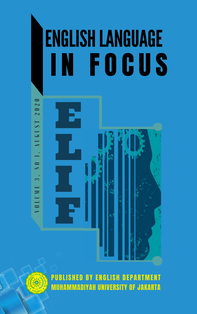Improving English Learning Outcomes Through a Quantum Teaching Model
DOI:
https://doi.org/10.24853/elif.3.1.1-10Keywords:
English learning outcomes, Quantum Teaching model, TANDURAbstract
This research was motivated by the low level of primary English learning outcomes at SDN 02 Cireundeu. It can be seen that there were 21 out of 25 primary learners had a below minimum of completeness criteria (KKM). The objective of the research is indeed to increase the outcomes of primary English learners through a quantum teaching model. Classroom Action Research (CAR), a reflective and collaborative research focused on raising the teaching process quality, was preferred as a research method. The current study used the Kemmis and McTaggart principles, which cover four phases: planning, action, observation, and reflection. The 25 fifth-grade primary English learners, 11 males, and 14 females have participated in this study. Two-cycle actions have been carried out to achieve success criteria of completeness. Based on the results, the quantum teaching model implementation has led to an improvement in the results of each cycle. It can be shown that the students' outcome in Cycle I was 36%, while in Cycle II was 64%. These findings revealed that improvement has been achieved in Cycle II and the completeness criteria have been accepted. In a conclusion, English learning outcomes were significantly improved by implementing a quantum teaching model to the fifth grade of primary learners at SDN 02 Cireundeu.References
Afacan, Ö., & Gürel, İ. (2019). The Effect of Quantum Learning Model on Science Teacher Candidates’ Self-Efficacy and Communication Skills. Journal of Education and Training Studies, 7(4), 86–95. https://doi.org/10.11114/jets.v7i4.4026
Altın, M., & Saracaoğlu, A. Seda. (2019). The Effect of Quantum Learning Model on Foreign Language Speaking Skills, Speaking Anxiety, and Self-Efficacy of Secondary School Students. Dil ve Dilbilimi Çalışmaları Dergisi, 15(3), 1083–1104. https://doi.org/10.17263/jlls.631550
Asgari, M., & Borzooei, M. (2013). Evaluating the Learning Outcomes of International Students as Educational Tourists. Journal of Business Studies Quarterly, 5(2), 130–140.
DePorter, B., Reardon, M., & Nourie, S. S. (2002). Quantum Teaching: Orchestrating Student Success. Boston: Allyn and Bacon.
Deslauriers, L., & Wieman, C. (2011). Learning and Retention of Quantum Concepts with Different Teaching Methods. Physical Review Special Topics - Physics Education Research, 7(1), 1–6. https://doi.org/10.1103/PhysRevSTPER.7.010101
Desstya, A. (2015). Penguatan Karakter Siswa Sekolah Dasar Melalui Pembelajaran IPA. In Prosiding Seminar Nasional dan Call for Papers Pendidikan Guru Sekolah Dasar UMS 2015 (pp. 69–75). Universitas Muhammadiyah Surakarta. Retrieved from http://hdl.handle.net/11617/6018
Djamarah, Bahri, S., & Zain, A. (2002). Strategi Belajar Mengajar. Jakarta: Rineka Cipta.
Gamoran, A., Secada, W. G., & Marrett, C. B. (2006). The Organizational Context of Teaching and Learning. In Handbook of the Sociology of Education (pp. 37–63). Springer US. https://doi.org/10.1007/0-387-36424-2_3
Hadi, M. S. (2019). The Use of Song in Teaching English for Junior High School Students. English Language in Focus (ELIF), 1(2), 107–112. https://doi.org/10.24853/elif.1.2.107-112
Izzah, L., & Hadi, M. S. (2020). Mobile-Assisted Language Learning (MALL) in EFL listening: An Indonesian Perspective. International Journal of Advanced Science and Technology, 29(7), 3838–3845.
http://sersc.org/journals/index.php/IJAST/article/view/23150
Kraiger, K., Ford, J. K., & Salas, E. (1993). Application of Cognitive, Skill-Based, and Affective Theories of Learning Outcomes to New Methods of Training Evaluation. Journal of Applied Psychology, 78(2), 311–328. https://doi.org/10.1037/0021-9010.78.2.311
Nasrallah, R. (2014). Learning Outcomes’ Role in Higher Education Teaching. Education, Business and Society: Contemporary Middle Eastern Issues, 7(4), 257–276. https://doi.org/10.1108/EBS-03-2014-0016
Rachmadtullah, R., Nadiroh, N., Sumantri, M. S., & Zulela, M. (2018). Development of Interactive Learning Media on Civic Education Subjects in Elementary School. In Proceedings of the Annual Civic Education Conference (ACEC 2018) (pp. 289–292). Atlantis Press. https://doi.org/10.2991/acec-18.2018.67
Sumantri, M. S. (2016). Asesmen dan Intervensi Pedagogik dalam Membangun Generasi Emas Ditinjau dari Perspektif Pengembangan Kreativitas Siswa Kelas Awal Sekolah Dasar. Jurnal Pendidikan Dasar, 7(1), 74–89. https://doi.org/10.21009/JPD.071.07
Suparno, S. (2010). Pengembangan Model Modifik
asi Perilaku Sosial Melalui Media Belajar Berkonsep Konvergensi Bagi Anak Autis. Jurnal Kependidikan, 40(2), 201–214. https://doi.org/10.21831/jk.v40i2.499
Suradika, A., Winata, W., Wicaksono, D., Hadi, M. S., & Rifqiyati. (2020). The Influence of Instructional Materials and Educational Background on the Learning Outcomes of Islamic Education. Solid State Technology, 63(6), 1027–1043.
http://solidstatetechnology.us/index.php/JSST/article/view/2185
Suryani, N. (2013). Improvement of Students’ History Learning Competence through Quantum Learning Model at Senior High School in Karanganyar Regency, Solo, Central Java Province, Indonesia. Journal of Education and Practice, 4(14), 55–63. Retrieved from http://www.iiste.org/
Susiani, K., Dantes, N., & Tika, N. (2013). Pengaruh Model Pembelajaran Quantum Terhadap Kecerdasan Sosio-Emosional dan Prestasi Belajar IPA Siswa Kelas V SD di Banyuning. Jurnal Pendidikan Dasar, 3, 1–10. Retrieved from https://ejournal-pasca.undiksha.ac.id/
Downloads
Published
Issue
Section
License
Authors who publish with this journal agree to the following terms:
- Authors retain copyright and grant the journal right of first publication with the work simultaneously licensed under a Creative Commons Attribution License that allows others to share the work with an acknowledgment of the work's authorship and initial publication in this journal.
- Authors can enter into separate, additional contractual arrangements for the non-exclusive distribution of the journal's published version of the work (e.g., post it to an institutional repository or publish it in a book), with an acknowledgment of its initial publication in this journal.
- Authors are permitted and encouraged to post their work online (e.g., in institutional repositories or on their website) before and during the submission process, as it can lead to productive exchanges, as well as earlier and greater citation of published work (See The Effect of Open Access).


